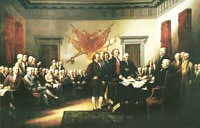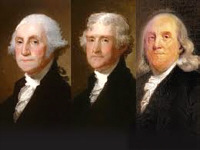

"BEING NECESSARY ...
![]()
By L. Neil Smith
Exclusive to Jews for the Preservation of Firearms Ownership
© Copyright JPFO. Inc 2012
A well-regulated militia being necessary to the security of a free state, the right of the people to keep and bear arms shall not be infringed.
-- United States Constitution, Amendment II
 It's likely that no sentence has ever received as much scrutiny as the twenty-seven words of the Second Amendment, one of the first ten amendments to the United States Constitution, collectively known as the Bill of Rights and, as such, representing the highest law of the land.
It's likely that no sentence has ever received as much scrutiny as the twenty-seven words of the Second Amendment, one of the first ten amendments to the United States Constitution, collectively known as the Bill of Rights and, as such, representing the highest law of the land.
A sophisticated understanding of the Bill of Rights informs us that it has been seriously misnamed over the centuries. It is not, in fact, a laundry-list of the things that citizens under its authority are allowed to do. Quite the opposite, it is a list of things that the government may never do. The document isn't about us, it's about all of those whom we have put in office or who have been put in office for us.
As "men of the left", including the President, have demonstrated they are fully aware, all of the rights identified by British and American political philosophers during the period leading up to the Revolution are negative in character, items (like search and seizure without due process) that should never be a part of an individual's life.
 The Declaration of Independence acknowledges "certain inalienable rights"; the Bill of Rights treats them as having previously existed, and -- unique in the king-infested world of the late 18th century -- offers those pre-existing rights legal protection. Contrary to the maunderings of the trendy left, the Bill of Rights does not create, establish, or dispense rights of any kind to anybody. Nor was it meant to.
The Declaration of Independence acknowledges "certain inalienable rights"; the Bill of Rights treats them as having previously existed, and -- unique in the king-infested world of the late 18th century -- offers those pre-existing rights legal protection. Contrary to the maunderings of the trendy left, the Bill of Rights does not create, establish, or dispense rights of any kind to anybody. Nor was it meant to.
Those who favor an unalienable individual, civil, Constitutional, and human right to own and carry weapons tend to focus on the latter half of the Second Amendment, after the comma in Thomas Jefferson's draft: "the right of the people to keep and bear arms shall not be infringed."
Those who, for one reason or another, would rather see the entire populace disarmed, tend to be more interested in the first four words, beginning and ending with "A well-regulated militia ... " arguing that here in black and white (or brown iron-gall ink on yellowed sheep-skin parchment), the Constitution establishes weapons-bearing as a purely collective right, meant only to protect the government, and completely unnecessary, now that there's a National Guard -- not to mention a powerful standing army the Founders hated and feared the very thought of.
Thus the battle has raged for more than a century, and in only rare instances has the phrase " ... being necessary to the security of a free state ... " been given more than passing consideration, except by those intent on trying to collectivize an individual right. And yet it holds the key to understanding what the Founding Fathers had in mind.
"Well-regulated" in the 18th century, meant properly supplied and trained, and nothing else -- especially not "perpetually in peril of having their guns taken away". Yet to the anti-arms crowd, who believe that the government is the store and source of all rights, it means gun owners must be constantly harried, mocked, threatened, and spied on. Their impulse, given sufficient excuse -- Hurricane Katrina, for example -- is to seize privately-owned weapons from their owners. After all, you can't have folks being armed in an emergency. Who knows what they might do, up to and including surviving without government help?
The trouble with their position -- as well as with the tens of thousands of statutes, ordinances, laws, executive orders, and regulations they have written to support it -- is that it is flatly illegal, within several meanings of the term. Doubt me? Then, as President Lyndon Baines Johnson used to say, "Come, let us reason together ... "
According to the Second Amendment, a "well-regulated militia" is "necessary to the security of a free state". The Amendment makes it equally clear that "the right of the people to keep and bear arms" is necessary to raising a militia, universally understood in those days as everyday people who would remain unorganized until called upon to fight. Being prepared for that call meant owning knowing how to use firearms.
In other words, it is impossible to maintain a free state without a militia, and it is impossible to maintain a militia if the people's basic right to own and carry weapons is infringed -- to this day, a word specifically meaning interfered with even slightly, or in tiny increments.
As I said, in the 18th century, "well-regulated" meant properly supplied and trained. The word "regulate" carried absolutely none of the connotations of government control that it does today; the new meaning is strictly a product of Progressive Era politics, roughly 1875-1920.
 The Founders were desperately afraid of the government acquiring a standing army, so they couldn't have been thinking of the National Guard in writing the Second Amendment, as is often claimed, or of anything remotely like it. Very likely they would have regarded the vast numbers of police employed across America today as a standing army.
The Founders were desperately afraid of the government acquiring a standing army, so they couldn't have been thinking of the National Guard in writing the Second Amendment, as is often claimed, or of anything remotely like it. Very likely they would have regarded the vast numbers of police employed across America today as a standing army.
In the same way, whenever they spoke of a militia, the Founders were speaking of "everybody" -- in those days, meaning every free male -- who could lift and aim a rifle and fire it. Later advances in civil rights eventually qualified women and individuals of color for the militia.
The Founders' thinking in this area was prophetic. Today (with the remarkable exception of the growing ranks of those who call themselves "Oath Keepers") our military and police are mostly controlled by the enemies of liberty. The survival of freedom depends on the unorganized militia who scared the pants off the enemies of liberty in 2009 when they showed up in the streets as the Tea Parties. The petitions of secession being signed now by hundreds of thousands across the nation must feel, to those who hate, loathe, and despise freedom, like an LSD flashback.
I am not a lawyer, nor do I play one on TV. But the Founders didn't write our nation's basic documents to be interpreted -- or interpreted away -- by lawyers. Not did they mean for judges to busy themselves the way they do today, telling us that our rights aren't quite what we have always believed them to be. Thomas Jefferson, especially, author of the Declaration of Independence , wrote in very clear, plain, beautiful English that doesn't call for interpretation. And so did James Madison, who wrote the Bill of Rights in order to placate and appease his friend Jefferson, who was deeply suspicious of the strong central government that the Constitution called into being.
All of which means that my plain English understanding of the Constitution, of the Bill of Rights, and of the Second Amendment, and very likely yours, as well, is just as respectable -- if not actually more so -- than that of any lawyer or judge, specialized individuals whose professional education invariably seems to distort their very perception of reality. And what I read in the Second Amendment is this:
If, indeed, the individual right to own and carry weapons is defined as being necessary to the security of a free state, then advocating, introducing, sponsoring, voting for, or enforcing victim disarmament -- gun control -- laws are all traitorous acts. Thanks to the First Amendment, private citizens are free to say anything they wish, but government officials, elected or not, have taken an oath to uphold and defend the Constitution against "all enemies, foreign and domestic."
 Any list of the many foreign enemies of the Constitution would have to include the United Nations among its first and foremost. The U.N. has even had the temerity, recently, to order the President to punish the states of Washington and Colorado for having taken steps to legalize the production, sales, and use of recreational marijuana. The U.N. wants those votes somehow reversed, presumably by executive decree. That should give anybody a good idea of how the U.N. would act if it were given more power. Once a country signs on to its "Universal Declaration of Human Rights", it becomes illegal within that country to criticize either the document or the organization that generated it.
Any list of the many foreign enemies of the Constitution would have to include the United Nations among its first and foremost. The U.N. has even had the temerity, recently, to order the President to punish the states of Washington and Colorado for having taken steps to legalize the production, sales, and use of recreational marijuana. The U.N. wants those votes somehow reversed, presumably by executive decree. That should give anybody a good idea of how the U.N. would act if it were given more power. Once a country signs on to its "Universal Declaration of Human Rights", it becomes illegal within that country to criticize either the document or the organization that generated it.
For its own part, the current U.S. Presidential administration is deeply involved in what amounts to a treasonous conspiracy with that despicable organization -- long a self-declared and outspoken enemy of everything that once made America the most wonderful place to live in the history of humanity -- to violate and void the Bill of Rights, through a "small arms treaty" that would give the U.N. control over the production, sales, ownership, and use of personal weapons in America.
Because such an agreement clearly endangers the security of a free state, the activities of the President and his hirelings, particularly the Secretary of State, are treasonous. Treason, of course, is fully prosecutable.
And there are traditional punishments for treason ...
~~~~~~~~~~~~~~~~~~~~~~~~~~~~~~~~~~
JPFO has quite an extensive index page on Bill of Rights matters which you can check out here. Much reference and interest.
![]()
A fifty-year veteran of the libertarian movement, L. Neil Smith is the Author of 33 books including The Probability Broach, Ceres, Sweeter Than Wine, And Down With Power: libertarian Policy In A Time Of Crisis. He is also the Publisher of The Libertarian Enterprise, now in its 17th year online.
Visit the Neil Smith archive on JPFO.
© Copyright Jews for the Preservation of Firearms Ownership 2012.
![]()

























